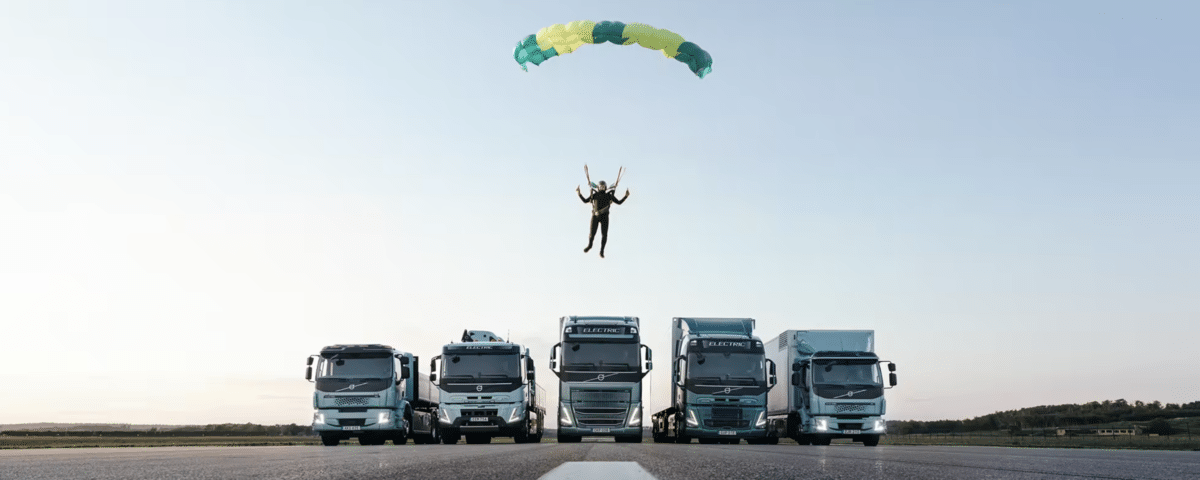Volvo Case
“Volvo Group is committed to driving the transition to sustainable, safe, and more productive transport and infrastructure solutions, while making the journey to become a net-zero society.” (quote from Volvogroup.com). It was with this assignment that Angie Breugelmans, Sustainability Manager at Volvo, came to Fynch. In the conversations with her, we witnessed how sustainability is woven into Volvo’s DNA. Not only do their products stand out, but also the policies within the organization. The mobility policy is one of the most sustainable policies we have encountered. Employees can for example earn a special performance bonus when traveling sustainably to work. We asked Angie how Volvo made its choices:
Tell me something about yourself? About your role at Volvo Group Netherlands and what to you is important?
I grew up in the US, in a very car-centric environment. As I got older, I felt challenged to better understand and ultimately promote more sustainable modes of transportation. Given the global environmental crisis, it is clear that a range of strategies are needed to achieve an acceptable footprint in the transportation sector. At Volvo Group Netherlands (Volvo), I had the unique opportunity to reduce our overall footprint, from our employees’ commutes to the products we bring to the market, and everything in between. For myself, the most important aspect of my job is feeling like I’m making a difference.
How does Volvo look at sustainability?
Sustainability is one of Volvo’s 3 core values alongside Safety and Quality. Since 1972 Volvo has had an active sustainability policy.
We strive for minimal environmental impact in production, use, and recycling but also from all our dealerships.
In addition to Fynch Mobility, what does Volvo offer its employees to help them make sustainable choices?
In early 2023, we launched our new Mobility Plan, which addresses sustainable business travel and commuting on several levels. One goal is to electrify our lease car fleet by 2026, including charging stations at offices, retail locations and, where possible, at home. We have also introduced policies and financial incentives to reduce business kilometers, as well as the launch of the lease bike. But most importantly, we introduced a new temporary support package (TOP! allowance) where employees receive an additional financial incentive on days they travel sustainably. In short, employees receive €4 gross per day that they travel sustainably, namely, by electric or hybrid vehicle, bicycle, public transport, or carpool.
Fynch Mobility has already been mentioned in the question above, how did you come to Fynch?
Based on our own targets aimed at reducing carbon emissions from business travel and commuting, we were initially looking for a tool to help us track our progress. Around that time, the new government requirements for reporting business and commuting data starting in 2024 were announced (see Reporting Requirement Work-related Mobility of Persons). We researched a few options and ultimately found that Fynch offered the most options to meet the needs of our diverse workforce, from mechanics to managers.
You first piloted Fynch with a small group of colleagues, what were the findings?
The initial trial of the app went surprisingly smoothly! The few minor issues were all quickly resolved.
Fynch has three pillars:
- (Automatic) trip registration for the upcoming CO2 obligation
- Read travel claims easily and automatically
- Behavior change program leading to more sustainable travel
Which of these pillars was most important to Volvo and why?
Actually, each of these pillars is equally important to us. The data generated by the app gives us the tools to make improvements and meet our requirements, but also to streamline the administration of reimbursement payments. And ultimately, the intention of regulations is to influence and encourage change in behavior. Personal engagement is the key to effective change.
The Fynch app, if desired, automatically tracks all travel movements. These trips remain on the employee’s phone and are not shared. When the employee claims they share the number of kilometers traveled, private movements we and the employer cannot see.
Yet most of the questions we get from potential Fynch users are privacy related. What would you say to these people?
I would say that Fynch does everything possible to protect and secure their information, and that the employer only receives a small portion of the information needed for reporting and payment of benefits.
What changes do you expect within the organization thanks to Fynch?
I hope my colleagues become more aware of the impact their daily choices have and feel inspired to make even small changes. Because small choices lead to big changes!
What do you like most about Fynch?
What I like most about Fynch is the flexibility it offers. There is something suitable for everyone!
What are you still missing at Fynch?
At Volvo, we try to be aware of how inclusive our policies and strategies are. We have received some feedback from our workshops about the naming of ‘Office Day’ in the app, which doesn’t really apply to them. Again, going back to my point about personal engagement, this is a very relevant point. Fortunately, Fynch is working to find an alternative.
Finally, what question should we really have asked you but didn’t in this interview and what would be your answer to that question?
Which part of the implementation process did you find most challenging and what advice would you give other companies?
Technical problems can always be solved, but communication is the key to ensuring that change is seen positively. Therefore, make sure you give adequate attention and resources to your internal communication strategy.
